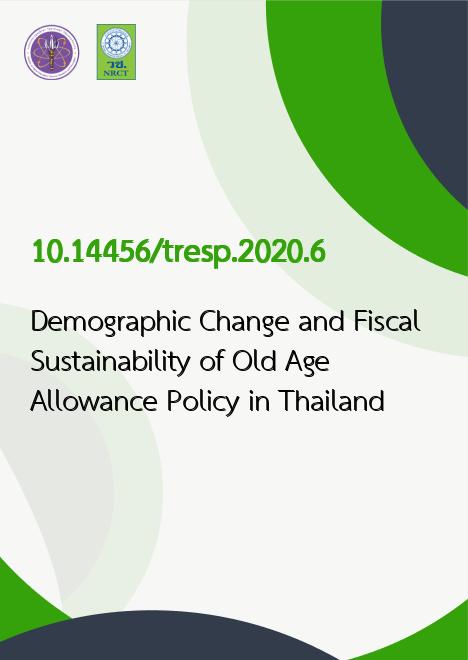
|
Demographic Change and Fiscal Sustainability of Old Age Allowance Policy in Thailand |
|---|---|
| รหัสดีโอไอ | |
| Creator | Teerapong Wijaranayarn |
| Title | Demographic Change and Fiscal Sustainability of Old Age Allowance Policy in Thailand |
| Publisher | Thammasat University |
| Publication Year | 2563 |
| Journal Title | Thammasat Review of Economic and Social Policy |
| Journal Vol. | 6 |
| Journal No. | 2 |
| Page no. | 78-111 |
| Keyword | Ageing society, Fiscal sustainability, Demograhic change, Thailand |
| URL Website | http://www.tresp.econ.tu.ac.th/ |
| Website title | Thammasat Review of Economic and Social Policy |
| ISSN | 2465-4167 |
| Abstract | Thailand must face the challenges of an ageing society. The government should manage their expenditure and revenue collection in accordance with an increase in the number of elders in the society on account of old age allowance expenditures. Old age allowance aims to cover all elders except those in the pension system. This paper examines the impact of demographic change on fiscal sustainability of old age allowance policy, particularly by setting model, where a computational overlapping generations model is employed under a general equilibrium context. The simulation is divided into 3 parts: the first part is the impact of demographic change on the economy, the second part is the introduction of old age allowance and its impact on fiscal burden, and the third part is the fiscal impact of an increase in government expenditure. The study found that government expenditure will increase as there will be an increasing proportion of aged individuals. The increase in government expenditure causes an increase in public debt, which eventually causes the delay of repayment of public debt and a shift to the next generation. The increase of value-added tax rate generates more revenue collection for the government when compared to increasing personal income tax rate. The value-added tax has more distortionary effect on the economy than an increased personal income tax. |